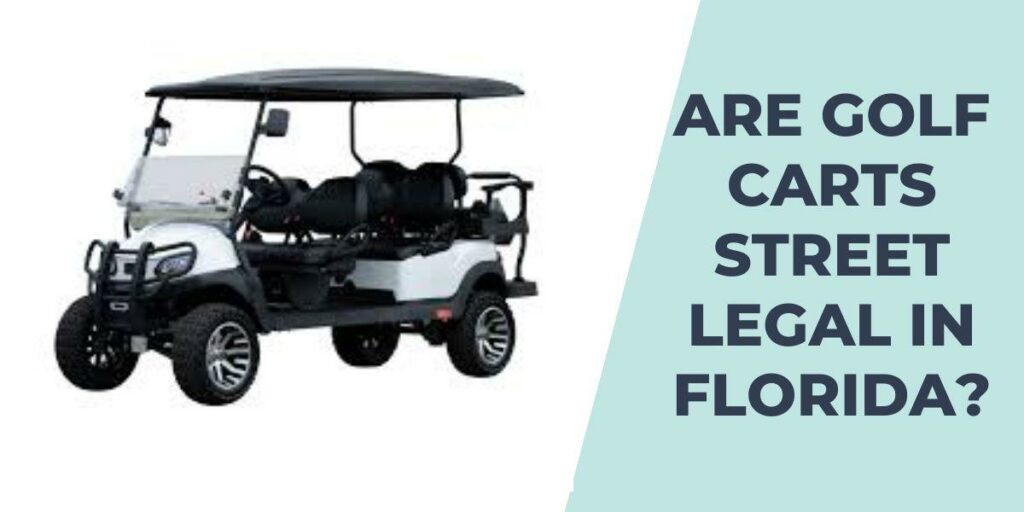Are Golf Carts Street Legal in Florida? This question has been asked by lots of Floridians when they consider the use of golf carts to move around on public roads.
As it turns out, the rules surrounding golf carts and their use on public roads can be a bit confusing.
This article provides all your information about the Florida Golf Cart Street Legal Requirements and guidelines.
Are Golf Carts Street Legal in Florida?
According to section 320.01(22), Florida Statutes, golf carts in Florida are Street legal on designated roadways with a 30 mph or less speed limit. However, compliance with local ordinances is necessary, and operators must be 14 or older.

Check out my post on How to Register a Golf Cart in Florida for a step-by-step process for registering your golf cart.
Are LSVs Street Legal in Florida?
Yes, Low-Speed Vehicles (LSVs) are street legal in Florida, but only under certain conditions. LSVs are a specific type of vehicle that have a maximum speed capability of between 20 and 25 miles per hour. In Florida, LSVs are considered motor vehicles and are subject to certain registration and titling requirements, as well as specific equipment and safety standards.
To be street legal in Florida, LSVs must be equipped with certain features such as headlights, taillights, turn signals, mirrors, and seat belts. Additionally, LSVs must display a special license plate, be insured, and be driven by a licensed driver.
LSVs are allowed to be driven on any road in Florida with a posted speed limit of 35 miles per hour or less, and they are not allowed to be driven on sidewalks or bicycle paths. However, it is important to note that local municipalities may have their own regulations regarding LSV use, so it is always a good idea to check with local authorities before operating an LSV on public roads in Florida.
Check out this article on Street Legal Golf Carts for Sale if you are interested in purchasing one.
What are Florida Golf Cart Street Legal Requirements?
Florida Golf Cart Street Legal Requirements are certain rules made by the Florida Department of Highway Safety and Motor Vehicles (DHSMV). These requirements are:
- The Florida Department of Highway Safety and Motor Vehicles (DHSMV) must register and insure the golf cart before it can be used on public roads.
- The golf cart must only be driven on roads with speed limits of 35 mph or less, except to cross a road where the speed limit is higher.
- A slow-moving vehicle (SMV) emblem must be visible on the golf cart’s front and rear.
- The golf cart’s headlights, taillights, turn signals, and brake lights must be in good working condition.
- If the golf cart has windshield wipers, it must have a windshield.
- The top speed of the golf cart must not exceed 20 mph.
- The brakes of the golf cart must be efficient, the tires safe, the steering reliable, and it must have a rearview mirror.
What Makes a Golf Cart Street Legal in Florida?
To be street legal in Florida, a golf cart must meet the definition in section 320.01(22), Florida Statutes, which states that it is designed for recreational purposes and cannot exceed speeds of 20 mph.
Also, having headlamps, tail lamps, stop lamps, turn signal lamps, rearview mirrors, reflex reflectors, windshields, parking brakes, seat belts, and Vehicle Identification Numbers are necessary to make a golf cart street legal in Florida
Florida Golf Cart Laws Sidewalks
Golf carts are allowed on sidewalks only if the following laws are strictly obeyed:
- Golf carts are allowed on residential sidewalks if the sidewalk is wide enough and not reserved for pedestrians.
- They must not be ridden on sidewalks in a manner that endangers others.
- Golf carts are not allowed on sidewalks or high-traffic areas of commercial parks.
- The driver must obey all traffic laws, including traffic and stop signs and speed limits.
Do Golf Carts Need Registration or Insurance Coverage in Florida?
Golf carts do not require registration or insurance coverage because Florida law allows them to be operated on public roads and streets only if they are used for golfing purposes, transportation within a gated retirement community, or on roads where the posted speed limit is 25 mph or less.
Insuring is always recommended, though. Check out my post on Best Golf Cart Insurance to get one for yourself.
Do Golf Carts Need License Plates in Florida
For golf carts to be driven on public roads or highways in Florida, they must have a license plate.
Florida LSV Laws
The following are some Florida Golf Cart Street Legal Requirements that apply to LSVs (Low-Speed Vehicles) in Florida:
- Every LSV must be registered with the Florida Department of Highway Safety and Motor Vehicles (DHSMV).
- Every LSV can only be operated on roads with speed limits of 35 mph or less, except when crossing a road where the speed limit is higher.
- Every LSV must have a 17-character vehicle identification number (VIN).
- Every LSV must only be operated on streets where the posted speed limit is 35 mph or less.
- Every LSV must not be operated on sidewalks or bicycle paths except when crossing the path at an intersection.
- Every LSV must have certain safety features, including a windshield, rearview mirrors, seat belts, headlights, turn signals, tail lights, and brake lights.
- Every LSV operator must have a valid driver’s license or learner’s permit.
- Unless equipped with proper lighting, every LSV must be operated only during daylight hours.
Florida Golf Cart Laws Age Requirements
The following are Florida golf cart laws on the age requirement of every golf cart driver:
- A person must be 14 years old to operate a golf cart on public roads.
- A person under 14 must not operate a golf cart on public roads unless accompanied by an adult at least 18.
Consequences of Violating Florida Golf Cart Street Legal Requirements
Violating Florida Golf Cart Street Legal Requirements comes with certain consequences:
Harm to Individuals or Property:
If a golf cart does not comply with the Florida golf cart street legal requirements, it may pose a safety risk to the operator, passengers, and the property and lives of individuals.
Citations and Fines:
If a golf cart is found to violate highway laws, the operator may be given a subpoena and ordered to pay a fine. The amount of the fine is subject to a specific violation.
Impounding:
If a golf cart is found to violate the Florida golf cart street legal requirements, the cart may be seized until necessary corrections are made to comply with the law.
Liability:
If a golf cart violates the Florida golf cart street legal requirements and causes an accident or property damage, the operator may be liable for the damage.
How Much Does It Cost to Register a Golf Cart in Florida?
Registering a golf cart in Florida will cost $20-$30 and certain additional fees like title and sales tax fees. This amount could be higher for older golf carts.
FAQ on Are Golf Carts Street Legal in Florida
The following are frequently asked questions related to Are Golf Carts Street Legal in Florida:
Can I Drive My Golf Cart on The Sidewalk in Florida?
Yes, you can as long as you don’t drive in a manner that endangers others and you obey traffic rules. You must also yield to pedestrians.
Can You Drive a Golf Cart on The Street in Florida?
As long as the golf cart is modified to meet the state’s safety standards and is registered and insured properly, yes, you can drive a golf cart on the street in Florida.
Do Golf Carts Need License Plates in Florida?

Yes, golf carts in Florida must have a license plate to be driven on public roads or highways.
Conclusion
In conclusion, golf carts are street legal in Florida as long as they meet the definition outlined in section 320.01(22), Florida Statutes. They can only be operated on designated roadways with a speed limit of 30 mph or less and must comply with local ordinances. Additionally, operators must be at least 14 years old. Therefore, to answer the question “Are Golf Carts Street Legal in Florida,” the answer is yes, under certain conditions.



